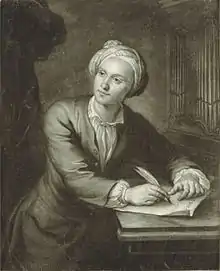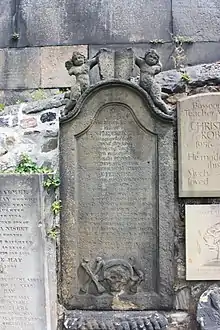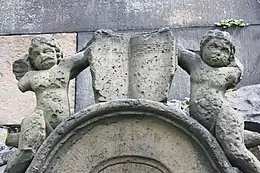John Frederick Lampe
John Frederick Lampe (born Johann Friedrich Lampe; probably 1703 – 25 July 1751) was a musician and composer.

Life


He was born in Saxony, but came to England in 1724 and played the bassoon in opera houses.
Like Arne, Lampe wrote operatic works in English in defiance of the vogue for Italian opera popularised by George Frideric Handel and Nicola Porpora. Lampe, along with Henry Carey and J. S. Smith, founded the short-lived English Opera Project. He became a friend of Charles Wesley, and wrote several tunes to accompany Wesley's hymns. His works for the stage include the mock operas Pyramus and Thisbe (1745) and The Dragon of Wantley (opera) (1734), which ran for 69 nights, a record for the time, surpassing The Beggar's Opera.
He was based for a time in Dublin and later in Edinburgh, where he died. He is buried in Canongate Kirkyard on the Royal Mile. The grave lies to the north-east of the church behind the Fettes vault.
Works
- The Cuckoo Concerto
- Cupid and Psyche or the Columbine Courtezan
- The Dragon of Wantley
- Hymns on the Great Festivals and other Occasions
- The Perfections of True Love
- Pyramus and Thisbe
Family
His wife, Isabella Lampe, was sister-in-law to the composer Thomas Arne with whom Lampe collaborated on a number of concert seasons. John and Isabella's son, Charles John Frederick Lampe, was a successful organist and composer as well.
References
- Lee, Sidney, ed. (1892). . Dictionary of National Biography. 32. London: Smith, Elder & Co.